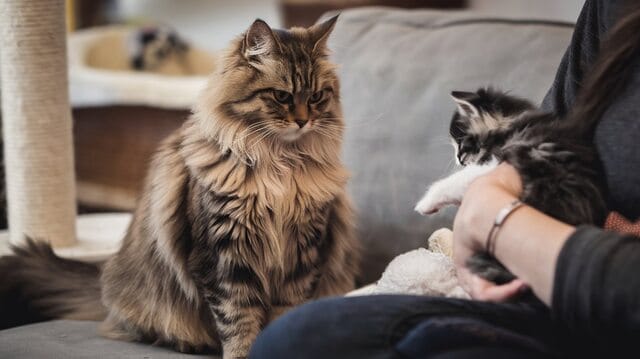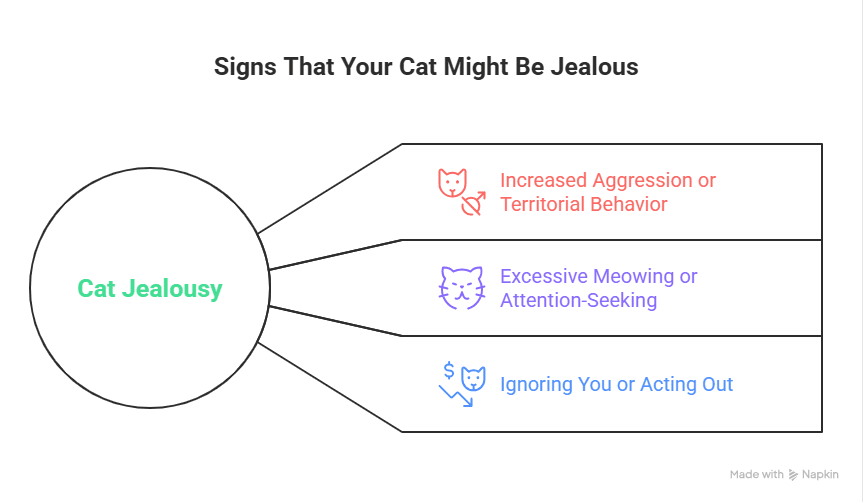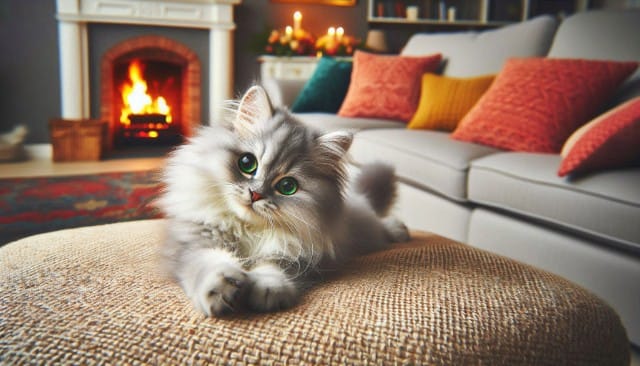
Introduction
Have you ever noticed your cat acting strange when you give attention to another pet or family member? Maybe they suddenly start meowing excessively, knocking things over, or even refusing to cuddle with you. If this sounds familiar, you might be wondering: Do cats get jealous?
While cats don’t experience jealousy in the same way humans do, they can become possessive, territorial, or insecure when they feel they are not getting enough attention. Understanding your cat’s emotions can help prevent unwanted behaviors and create a peaceful home for everyone. Let’s dive into the signs of jealousy in cats and what you can do about it.
Do Cats Actually Feel Jealous?
Cats are independent creatures, but they are also very observant. They quickly pick up on changes in their environment, especially when it involves their humans.
While jealousy is a complex human emotion, cats can exhibit territorial behavior, possessiveness, and attention-seeking tendencies—all of which mimic jealousy. In reality, your cat may not be jealous in the way humans experience it, but they might feel threatened, insecure, or left out when they sense competition for your affection.
Signs That Your Cat Might Be Jealous

Every cat expresses their emotions differently, but here are some common signs that may indicate jealousy:
1. Increased Aggression or Territorial Behavior
- Swatting, hissing, or growling at a new pet or person.
- Blocking access to certain areas, such as your lap or bed.
- Guarding their food, toys, or litter box.
2. Excessive Meowing or Attention-Seeking
- Suddenly becoming vocal when you interact with another pet or family member.
- Pawing at you, rubbing against you more than usual, or even jumping on you.
3. Ignoring You or Acting Out
- Giving you the “cold shoulder” by refusing to cuddle or turning their back on you.
- Knocking things over, scratching furniture, or even refusing to use the litter box.
If you notice any of these behaviors when a new person or pet enters the picture, your cat might be feeling jealous.
Common Triggers for Cat Jealousy
1. A New Pet in the House
One of the biggest triggers of cat jealousy is the introduction of a new pet, especially another cat or dog. Cats see their home as their territory, and a new animal can feel like an invader.
2. A New Baby or Family Member
If you’ve recently had a baby or someone new moved into your home, your cat might feel like they are no longer your priority. The extra noise, new routines, and unfamiliar scents can make your cat feel uneasy.
3. Changes in Your Routine
Cats thrive on routine, so even small changes in your daily schedule can make them feel insecure. If you’ve started working longer hours or traveling more often, your cat may feel neglected.
4. Giving Attention to Another Pet or Person
If your cat sees you giving extra attention to another pet or person, they might start demanding more attention from you or acting out to get it.
How to Handle a Jealous Cat
1. Give Equal Attention
If you have multiple pets, make sure to spend quality time with each one individually. Play with your cat, cuddle them, and reassure them that they are still loved.
2. Provide Enrichment Activities
A jealous cat might just be bored. Make sure they have enough mental and physical stimulation:
- Interactive toys
- Scratching posts
- Window perches
- Puzzle feeders
3. Avoid Favoritism
It’s important to balance your attention so that your cat doesn’t feel left out. If you’re introducing a new pet or family member, gradually help your cat adjust by giving them positive experiences with the change.
4. Reward Positive Behavior
Whenever your cat reacts calmly to a new pet or person, reward them with treats, praise, or playtime. This helps reinforce positive behavior and reduce their insecurity.
When to Seek Help
Most cases of cat jealousy can be managed at home with patience and positive reinforcement. However, if your cat becomes overly aggressive, stops eating, or starts developing stress-related health issues, it might be time to seek help from a vet or animal behaviorist.
FAQs
1. Can cats get jealous of their owners?
Cats don’t feel jealousy the way humans do, but they can become territorial or possessive of their owners. If they feel ignored or see another pet or person getting more attention, they might act out.
2. How do I stop my cat from being jealous of my new pet?
Introduce the new pet gradually. Make sure your cat has a safe space, give them extra attention, and reward them for calm behavior. Keep interactions positive and never force them to get along too quickly.
3. Do male and female cats show jealousy differently?
There’s no significant difference between male and female cats when it comes to jealousy. However, some breeds—like Siamese and Bengals—are naturally more attention-seeking and may be more prone to jealous behavior.
Also Read - Why Is My Cat Losing Hair? 7 Possible Causes & How to Treat It
Conclusion
Cats may not experience jealousy in the same way humans do, but they definitely notice changes in their environment—especially when it involves their favorite humans. If your cat is showing signs of jealousy, don’t worry! With a little patience, reassurance, and positive reinforcement, you can help them feel more secure and happy in their home.
By understanding your cat’s emotions and needs, you can create a harmonious and stress-free environment for both you and your feline friend. 😺




